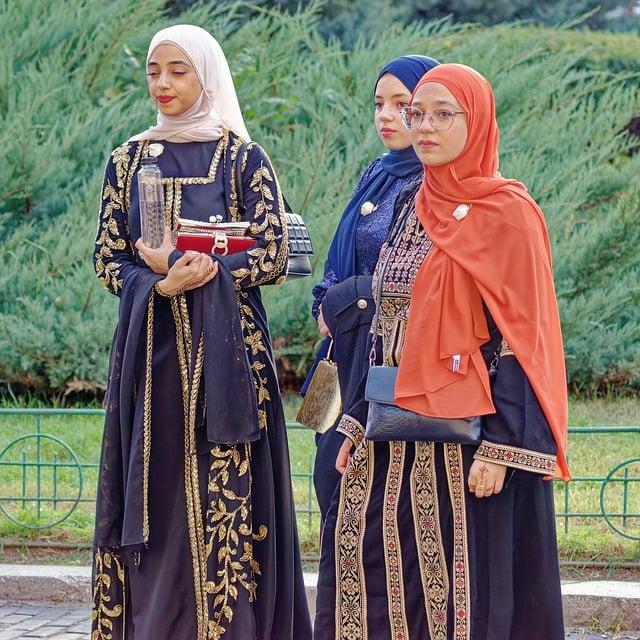In a small town, a curious Muslim boy named Amir watched his Christian friends prepare for Advent. Colorful candles adorned their windows, and the scent of baked goods filled the air. Intrigued, he asked his friend Sarah about the tradition. She explained how Advent was a time of anticipation and hope leading up to Christmas. Inspired, Amir decided to create his own countdown, marking each day with acts of kindness. As he lit a candle each evening, he felt a shared spirit of joy and community, bridging their different beliefs in a beautiful way.
Table of Contents
- Exploring the Intersection of Faith: Advent and Islamic Traditions
- Understanding the Significance of Advent in a Multifaith Context
- Celebrating Common Values: What Muslims Can Learn from Advent
- Fostering Interfaith Dialogue: Recommendations for Shared Celebrations
- Q&A

Exploring the Intersection of Faith: Advent and Islamic Traditions
While Advent is primarily a Christian tradition marking the anticipation of Christmas, its themes of hope, preparation, and reflection resonate across various faiths, including Islam. Muslims do not celebrate Advent in the same way Christians do, but they share similar values during their own significant periods, such as Ramadan. Both traditions emphasize the importance of spiritual readiness and community, fostering a sense of connection among believers. In this light, one can draw parallels between the reflective practices of Advent and the spiritual disciplines observed during Ramadan, highlighting a shared human experience of seeking deeper meaning and connection with the divine.
Moreover, the essence of Advent—waiting and preparing for a significant event—can be seen in Islamic practices surrounding major holidays like Eid al-Fitr and Eid al-Adha. During these times, Muslims engage in **prayer**, **charity**, and **community gatherings**, mirroring the communal aspects of Advent celebrations. The focus on **self-reflection** and **spiritual growth** during these periods invites individuals to contemplate their faith and actions, much like the Advent season encourages Christians to prepare their hearts for the coming of Christ. Thus, while the specific rituals may differ, the underlying themes of anticipation and spiritual renewal create a rich tapestry of interfaith understanding and respect.

Understanding the Significance of Advent in a Multifaith Context
Advent, a season of anticipation and preparation leading up to Christmas, holds a unique place in the Christian calendar. While it is primarily observed by Christians, its significance can be appreciated in a multifaith context. For many, Advent symbolizes a time of reflection, hope, and renewal, values that resonate across various religious traditions. In a world increasingly characterized by diversity, understanding the essence of Advent can foster interfaith dialogue and mutual respect. It invites individuals from different backgrounds to explore themes of waiting and preparation, which are universal experiences that transcend specific religious practices.
In the context of Islam, while Muslims do not celebrate Advent, they share similar periods of reflection and spiritual growth, such as Ramadan. This parallel highlights the importance of understanding and respecting each other’s traditions. Both Advent and Ramadan emphasize **self-discipline**, **community**, and **spiritual awakening**, allowing for a rich tapestry of shared values. By recognizing these connections, individuals can cultivate a deeper appreciation for the diverse ways in which faith communities prepare for significant events, ultimately enriching their own spiritual journeys and fostering a sense of unity in diversity.

Celebrating Common Values: What Muslims Can Learn from Advent
As the season of Advent approaches, it offers a unique opportunity for Muslims to reflect on shared values that transcend religious boundaries. While Advent is primarily a Christian tradition, its themes of hope, preparation, and community resonate deeply with Islamic teachings. Both faiths emphasize the importance of **compassion**, **charity**, and **spiritual growth**, making this time a perfect moment for interfaith dialogue and understanding. By engaging with the principles of Advent, Muslims can find inspiration in the ways that communities come together to support one another, fostering a spirit of unity and goodwill.
Moreover, the practice of **self-reflection** during Advent can serve as a powerful reminder for Muslims to engage in their own spiritual practices, such as **Salah** (prayer) and **Sawm** (fasting). The countdown to Christmas can parallel the Islamic observance of Ramadan, where both periods encourage believers to prepare their hearts and minds for deeper connections with God and their communities. By recognizing these commonalities, Muslims can celebrate the essence of Advent, embracing the values of **gratitude**, **forgiveness**, and **love** that are central to both traditions. This shared journey can pave the way for greater understanding and respect among diverse faith communities.

Fostering Interfaith Dialogue: Recommendations for Shared Celebrations
In a world rich with diverse beliefs and traditions, fostering interfaith dialogue can lead to deeper understanding and respect among different communities. One effective way to promote this dialogue is through shared celebrations that honor the unique aspects of each faith while finding common ground. **Organizing interfaith events** during significant religious observances can create opportunities for individuals to learn about one another’s practices and values. For instance, inviting members of various faiths to participate in a community Advent celebration can encourage discussions about the themes of hope, peace, and goodwill that resonate across religions.
To enhance these shared experiences, consider implementing the following recommendations: **Create inclusive programs** that highlight the significance of Advent while allowing space for other faith traditions to share their own celebrations. **Encourage storytelling** where participants can share personal experiences related to their faith, fostering empathy and connection. **Incorporate collaborative activities**, such as community service projects, that reflect the spirit of giving inherent in both Advent and other religious observances. By embracing these practices, communities can cultivate an environment of mutual respect and understanding, paving the way for a more harmonious coexistence.
Q&A
-
Do Muslims celebrate Advent?
No, Muslims do not celebrate Advent. Advent is a Christian tradition that marks the period of preparation for the celebration of the birth of Jesus Christ, which is not part of Islamic beliefs.
-
What is the significance of Advent?
Advent is significant for Christians as it symbolizes a time of reflection, anticipation, and preparation for Christmas. It involves themes of hope, peace, joy, and love, which are central to the Christian faith.
-
Are there any similar observances in Islam?
While Muslims do not celebrate Advent, they have their own periods of reflection and preparation, such as Ramadan, which is a month of fasting, prayer, and community, leading up to the celebration of Eid al-Fitr.
-
Can Muslims participate in Advent celebrations?
Muslims are generally encouraged to respect the traditions of other faiths, but participation in Advent celebrations is not common or customary for Muslims, as it is specifically a Christian observance.
In exploring the intersection of faith and tradition, we find that while Advent is not a Muslim celebration, the spirit of reflection and anticipation resonates across cultures. Understanding these differences enriches our shared human experience.

大家好,我是彼得潘,專業的手法身體治療師。我喜歡探索和研究各種主題,並透過與人工智慧的合作分享專業、實用、有趣的文章。我們定期進行人工審核,以確保內容的準確性。如果您發現文章中有任何不準確的地方,請隨時與我們聯繫,我們會及時糾正。您可以透過 [email protected] 與我們聯繫。



